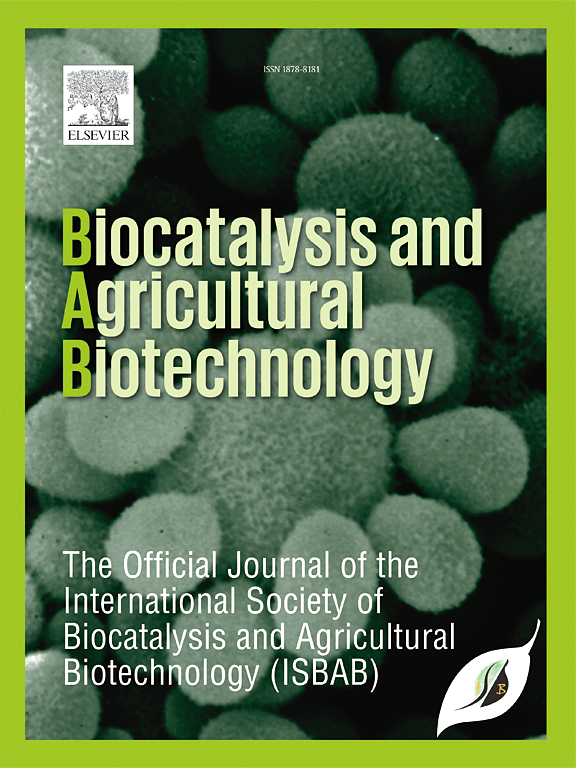Augmented elimination of cadmium and mercury by Cytobacillus firmus and Paenibacillus massiliensis isolated from heavy metal contaminated soil samples
IF 3.4
Q2 BIOTECHNOLOGY & APPLIED MICROBIOLOGY
引用次数: 0
Abstract
Cadmium and mercury, often classified as heavy metals or toxic elements, are prevalent in the environment due to industrial activities and pollution, posing risks to ecosystems and human health. The current research utilized the metal tolerance abilities of extremely resilient microorganisms, both individually and as part of a consortium, to address the complex issue of heavy metal pollution remediation. These bacterial strains were isolated from contaminated soil and subjected to screening under different treatment conditions. The examination and screening investigations have unveiled an isolated strain as Cd resistant bacteria viz. BS4 (Cytobacillus firmus) which have shown Cd removal up to 82 % and Hg tolerant bacterial isolate namely, BS10 (Paenibacillus massiliensis) with Hg removal efficiency of more than 63 %. Furthermore, the engineered microbial consortium (BS4 + BS10) has proven its capability to enhance the removal of Cd and Hg from soil samples. Extensive validation considered various factors such as pH, temperature, initial concentrations of Cd and Hg, and size of the inoculum, establishing the consortium's biosorption capacity. Structural alterations induced by microbial treatment were evidenced through FESEM and FTIR analysis. The metal-binding proficiency exhibited by this bacterial consortium underscores its potential as an efficient biosorbent for addressing heavy metal contamination.
从重金属污染土壤中分离的坚固胞杆菌和马斯利拟芽孢杆菌增强对镉和汞的去除作用
镉和汞通常被归类为重金属或有毒元素,由于工业活动和污染在环境中普遍存在,对生态系统和人类健康构成风险。目前的研究利用极具弹性的微生物的金属耐受能力,无论是单独的还是作为一个联合体的一部分,来解决重金属污染修复的复杂问题。从污染土壤中分离出这些菌株,并在不同处理条件下进行筛选。经检查和筛选,分离出一株抗Cd菌BS4(细胞芽孢杆菌)对Cd的去除率可达82%,而耐Hg菌BS10(马西利芽孢杆菌)对Hg的去除率可达63%以上。此外,工程微生物联合体(BS4 + BS10)已被证明具有增强土壤样品中Cd和Hg的去除能力。广泛的验证考虑了各种因素,如pH,温度,Cd和Hg的初始浓度,以及接种量的大小,建立了财团的生物吸附能力。通过FESEM和FTIR分析证实了微生物处理引起的结构改变。该细菌联合体表现出的金属结合能力强调了其作为处理重金属污染的有效生物吸附剂的潜力。
本文章由计算机程序翻译,如有差异,请以英文原文为准。
求助全文
约1分钟内获得全文
求助全文
来源期刊

Biocatalysis and agricultural biotechnology
Agricultural and Biological Sciences-Agronomy and Crop Science
CiteScore
7.70
自引率
2.50%
发文量
308
审稿时长
48 days
期刊介绍:
Biocatalysis and Agricultural Biotechnology is the official journal of the International Society of Biocatalysis and Agricultural Biotechnology (ISBAB). The journal publishes high quality articles especially in the science and technology of biocatalysis, bioprocesses, agricultural biotechnology, biomedical biotechnology, and, if appropriate, from other related areas of biotechnology. The journal will publish peer-reviewed basic and applied research papers, authoritative reviews, and feature articles. The scope of the journal encompasses the research, industrial, and commercial aspects of biotechnology, including the areas of: biocatalysis; bioprocesses; food and agriculture; genetic engineering; molecular biology; healthcare and pharmaceuticals; biofuels; genomics; nanotechnology; environment and biodiversity; and bioremediation.
 求助内容:
求助内容: 应助结果提醒方式:
应助结果提醒方式:


